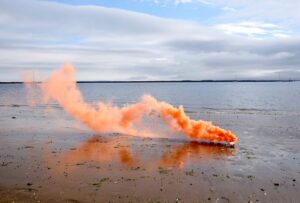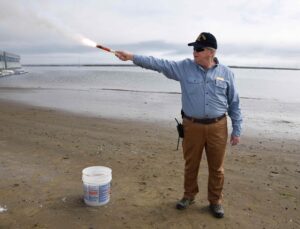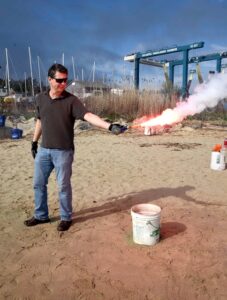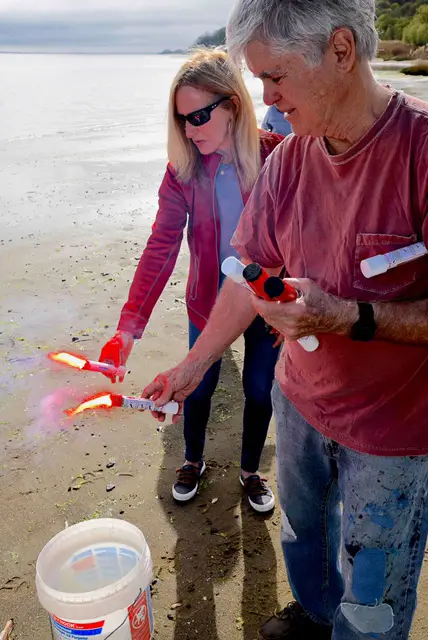With safety its priority, the Atlantic Highlands Yacht Club recently conducted an onshore demonstration and education session with safety flares to ensure all boaters are familiar with safety measures in the event of any emergencies aboard either motor or sailing craft.
“Most boaters have never actually activated a flare,” said Chuck Parker, who spearheaded the demonstration and lesson session. “Standing knee deep in water in a boat is not the time to read the small print instructions on the flare explaining how to ignite it,” he continued explaining to the crowd on the secluded beach at the eastern end of the Municipal Yacht Harbor.

Close to 50 voters took advantage of the unique safety program at the Harbor, with many ship captains also bringing crew members so all the people sailing on their craft had the opportunity to learn how to react in an emergency.
The US Coast Guard requires emergency signaling devices as part of boat safety equipment. Most boaters meet this requirement by carrying hand-held flares. However, flares are only valid for three years after their date of manufacture to meet Coast Guard regulations; Flares are also difficult to dispose of in a safe manner after their expiration date and many boaters keep them aboard. Instruction on proper safety measures for both retaining or disposing of outdated flares and other signal devices was also included in the demonstrations on the beach.
Parker pointed out the importance of checking flare supplies annually to ensure not only safety but conformance with navigational regulations.

Vice Commodore Joseph Patsco also pointed out that Monmouth County Hazardous Waste Facility offers proper disposal for Monmouth County residents for all hand-held road and marine flares, although it does not accept aerial or shotgun type flares. He recommended that those boaters living outside Monmouth County check with their own municipalities or counties regarding flare disposal.
While many flares operate long after their expiration date, another fact that was also demonstrated during the safety program, many do not. Once again, the time of the emergency is not the time to find out, the safety instructor said.
The Yacht Club’s Continuing Education Committee addressed all these issues during the demonstration session, using outdated flares to exhibit the proper means for holding them to prevent personal burns or fires aboard the craft or its sails. In some cases, flares as old as ten years were still able to be ignited, in other cases, flares five years old could not be ignited.

Instructions, which were held on wet sand rather than on floating craft to ensure more safety, enabled boaters to learn the most efficient methods of striking the flare, and the proper way to hold it to ensure it was best seen from a distance with protection from wind. Attendees also got to recognize how long a flare lasts, which are best for both daylight and nighttime exhibition and tips on how to attract the attention of passing aircraft should emergencies occur in the absence of other sea craft.
In addition to common, handheld emergency flares, SOLAS emergency flares and white collision warning flares were demonstrated.
In all demonstrations, instructors ensured slag from the burning flares would not be disposed of on the beach by providing buckets of water so participants could conduct their practices over water that could be disposed of properly after the session.
Yacht Club Commodore Lou Melillo noted the flare safety project is in addition to other programs the Yacht Club conducts to assist the local boating community. He also cited the club sponsorship and operation of the AHYC Special Olympics Sailing program for special needs people interested in sailing. The Club also sponsors the annual Ms. Sailing Regatta during which all the boats are captained and crewed by female sailors. All funds raised by supporters of the boats is donated to the New Jersey 180 Turning Lives Around project.”
Further information on the Yacht Club’s activities and educational sessions is available at https://ahyc.clubexpress.com .
Other stories on the Yacht Club



